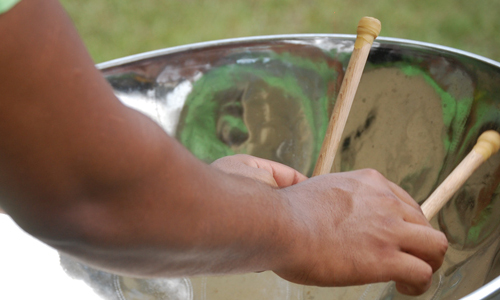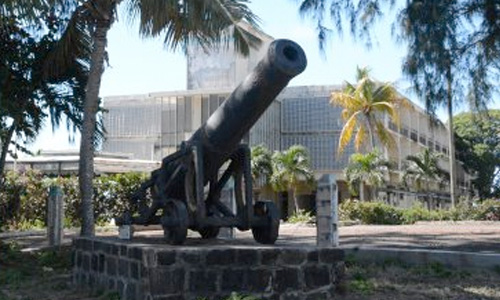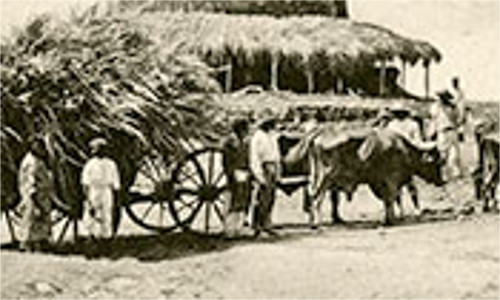First Steel Band Performance in a Church

The Rev D S Ching who was a serving at the Methodist Church in Basseterre in 1966 had an innovative streak. On Sunday the 6th February he welcomed the Coca Cola Steel Orchestra to accompany the organ in the church. Alexis Knight directed the band and Lorna Shepard played the organ. The performance was described as “commendable” and the Rev Ching praised the reverence that the Steel band players displayed n their renditions.
The reaction of some members of the church to the announcement had been far from encouraging. Some sent letters and even telegrams protesting such an unorthodox move and even accusing Rev Ching of giving in to pressure from his own congregation. The Minister however, thank them for their concerns and insisted that the decision to host the steel band had been his and his alone. He also reminded those present that in “every age comes something new” and pointed out that the steel pan was the West Indies’ contribution to music and as such should appreciated as part of the culture of the region.
Steel pan in churches, played either by soloists or by bands are no longer seen as sacrilegious. They became a feature of the Christmas concert held annually at St. George’s Anglican Church in Basseterre. Panists know that playing in church is different to playing on the road. Like musicians trained in the European classics, they understand what is appropriate for a particular occasion.
Partner Hand

This was a very common way of providing credit to persons who did not always have access to it. It is still practiced mostly by women.
Banks were often reluctant to provide financial services to persons with low income, so people found their own solutions. In finance these schemes have such names as “rotating savings” and “credit associations”. Caribbean people who are involved in it call it sou-sou, box money, meeting turn, and in St. Kitts it is commonly called Partner Hand.
To work, the system requires the formation of a committed co-operative association. It is very unlikely that there would be a written document to formalise the agreement. A great deal of trust is involved. Often the members of the group know each other well. They either work in the same place, or go to the same church, or are neighbours in the same village. Sometimes all three conditions apply.
The partners agree to pool an equal amount of money e.g. $100 for a period of time e.g. a month or two weeks. The money is deposited with the person who started the group. She would keep careful records making sure that everybody is paid up with in the agreed time. On an agreed day one of the partners receives the sum or hand. This continues until every member of the group has had her turn. It is also up to the leader of the group to keep a list of when each member would like to receive her hand. Sometimes a member would have a specific aim in mind for the money and would like to receive it at a certain time to make sure she can fulfil her purpose for joining the group. When all members have received the hand, the group can decide to do another round of hands or stop. At this point the membership can change.
The Partner Hand is not a savings scheme that pays returns (interest). It is simply a way to hold on to money by tying it up for a short period in the group. No one gains but also no one loses as long as each member is trustworthy and puts in her share.
Forts In Basseterre

Why were Forts necessary?
Small colonies like St. Kitts always were in danger of being taken by the enemy especially during wartime. There had to be a protective force on island at all times to guard both people and property. Many of these forces were voluntary, as in the Militia but during the Colonial years, the British Government sent out troops of soldiers who occupied the forts.
Names of the Forts
There were four forts in Basseterre stretching along the Bay front and thus providing security for the whole town. They were not all constructed at one time nor were they all standing at the same time. Today there is little left of any of them.
Location of the Forts
From West to East, there was Fort Thomas previously known as Bluff Point, Fort Londonderry, Fort Pine and Fort Smith. Few remains of these forts still exist. The most obvious reminder is the street named for the forts; Fort Street.
Costs of construction
Huge sums of money coming from both the Biritish Government and locally were used to construct these forts.
Besides the troops sent out by the Kings and Queens of England, there were local “volunteers” who raised troops called the Militia. Each estate had to “volunteer” one man and a horse and the trappings for the horse. The Militia added support to HM’s troops when needed.
Fort Thomas or Bluff Point
When Fort Thomas or Fort Bluff was in its heyday, it was armed with eight 24 pound guns facing the sea. Its elevation at the time was 53 feet above sea level.
Of all the forts which were located in Basseterre, this one is the most well known today as it has become the venue for many different events. Originally after its use as a fort it was used as a quarantine hospital for the troops which fell ill. It is located in what is known as the Fortlands named for their vicinity to the fort itself. The lands at one time were all cane fields. In the 20th century Fort Thomas was the site for a Holiday Inn, the well known chain of inns. After that it became known as the Fort Thomas Hotel for a few years. More recently it was the original home of the St. Kitts Music Festival until that venue was moved to Warner Park. It is presently being used as the “home” of part of the Defense Force, ironically coming full circle to house a military type group.
Fort Londonderry
This fort stood on the site of the first French fort on the island and was located centrally on the Bay Road between Brownbill Street to Fort Street. Some of its walls remain, as well as part of the magazine. A magazine is where the ammunition was stored. There is also another small area of stone construction which may have been either ordinance storage or cook house. A study of the remains is yet to be done.
Fort Pine
There is no evidence left of this fort today. It was located near to where the Sol oil storage facility is located today. When it was operational it held two 24 pound guns and was only 6.5 feet above sea level approximately the same level as Fort Londonderry near to it.
Fort Smith
This fort was located in Bird Rock on the premises now known as the Lighthouse. There are still a few reminders of it left today. If you look carefully through the fence you can see some of the stonework left from this fort.
Masters and Servants Act 1849

The Masters and Servants Act was passed in the Assembly on the 19 April 1849 and in the Council on the 10 May 1849.
The aim of the act was to secure continuous labour which was deemed advantageous to both employer and labourer.
The definition of labourer was very wide and included tradesmen, porters, sailors and domestics. If such a person was absent from work or damaged property of his/her employer, he/she was to be brought before two Justices of the Peas and if found guilty could be fined up to 50 shillings or condemned to jail for up to one month, with or without hard labour. Wages were forfeited to the employer.
If an employer abused a labourer or did not provide the necessary articles stipulated by contract, he could be fined up to £5 and costs.
Contracts whether written or verbal were to be effective for one calendar year.
Employers who terminated a contact had to pay a sum of one month wages or as determined by the Justices of the Peace.
Regulations were to be made about the employment of immigrants and consideration be given to the appointment of Superintendent of Immigrants to ensure that these regulations were observed.
Labourers who absent themselves without permission shall be summoned to appear before the Justices. If such persons do not appear then a warrant for their apprehension.
Persons harbouring or employing people under contract to somebody else could be fined or imprisoned.
The following are examples of cases of breach of contract as reported in the press. (A comprehensive listing of cases is impossible as very few newspapers have survived.)
St. Christopher Advertiser Aug 6, 1861
Sandy Point
Richard Lewis, Anthony Harris and Zachariah Warner were convicted of breach of contract as agricultural labourers. Defendants were employed to weed canes at Cranstouns Estate. They worked on Monday but on Tuesday they left their work saying they had too much to do. Fined 5 shillings and 1 shilling cost each or 14 days imprisonment with hard labour
St. Christopher Advertiser Oct 1, 1861
Sandy point 25th Sept
Before the police magistrate and J T Waith esquire
Marcus John was charged by Mr. D McLachlan with breach of his contract as a labourer on Fahie's estate . It appeared that defendant cultivated a piece of provision ground on the estate on condition that he should labour on the estate, he had absented himself from his labour for several weeks, in various excuses, but could nevertheless find plenty of time to work his provision ground: on the 18 Sept he turned out to work and was ordered to go and weed canes, he refused to do so and left the estate. This was the breach of contract complained of. Fined 49 shillings and 1 shilling costs or 1 calendar months imprisonment with hard labour and contract terminated.
St. Christopher Advertiser. 5 November 1861
Police intelligence
Cayon 25 Oct 1861
Before .Charles Cox and C A Smith esqrs
Catherine Isaac charged by Dorothy Daniels for nonpayment of 6 shillings 3 pence wages. Was ordered to pay the amount and costs.
St. Christopher Advertiser 12 Nov 1861
Police intelligence
Sandy Point 30 Oct 1861
William Berridge was charged by Mr. W B Amory with refusing to work he being a contract labourer. Defendant said that he did refuse to work on Saturday. Committed to gaol for one month with hard labour.
Sandy point 6 Nov 1861
George Stevens was convicted of a breach of contract as a labourer with S R Crossley on the 17 Sept and committed to goal for one month with hard labour.
St. Christopher Advertiser 5 Nov 1861
Police intelligence
Cayon 18 October 1861
Before the police magistrate and C A Smith Esq
Bramandat (a coolie) was charged by Mr Dolomon Shelford with breach of his contract as a labourer. It appeared from the evidence that the defendant refused to do the work ordered had not worked for a week. Defendant said that he would not do the work ordered (weed canes) but would do lighter work. He was committed to goal theer to be kept to hard labour for 30 days.
St. Christopher Advertiser 12 Nov 1861
Police intelligence
Old Road 29 October 1861
Before the police magistrate and R M Willsen esqr
Dheajan and Shampod (coolies) were charged by S H Richrdson Esq with breach of their contract as labourers by refusing to wor. They were fined 5 shillings each. The fines were paid
St. Christopher Advertiser August 28, 1866
Court of appeal
... Some persons were taken before the magistrate for a breach of contract. The case was heard and each person ordered to pay a fine. All seemed satisfied except one who said he would appeal. He accordingly did so and the Court of Appeal decided no contract was proved before the magistrate.
The respondent said that there was a contract between the father of the appellant and himself.
The Court was of the opinion that it was not legal and read the law concerning contracts. Decision of the magistrate reversed.
The Aftermath of the Fire of 1776

Selection from Samuel Augustus Mathew The Lying Hero, or an answer to J. B. Moreton’s Manners and Customs in the West Indies (St. Eustatius, Edward L. Low and Co for the author, 1793), pp.58-60.
At the great fire in 1776, it was supposed a number of robberies had been committed by the Negroes during the confusion the inhabitants were in, while endeavouring to save what they could from the flames: in consequence of which between thirty and forty, (of which I was one,) rode to the different estates in search of the thieves and what goods we could find: the goods recovered were very inconsiderable and scarcely worth the trouble; but every house we searched was opened to us by the negro who occupied it; they began with opening their principal box, chest or trunk, and after removing their burial cloaths, which were the first things in view, they desired we would search for what we suspected; upon examining the first box we discovered a bag of money, we imagined it was gold, and concluded from thence that it was stolen; but upon the old stocking being open which it proved to be, found half dollars, quarter dollars, pistreens, bits, half bits and black dogs to the amount of thirty odd pounds, from the appearance of the money it was evident it had lain a considerable time; upon being asked how he came by it, he readily answered, from his stock and ground, and further said his burying money was there also; he then drew out a bundle of cloth as it appeared to be, and after taking off about twenty pieces of old rag produced fifteen silver dollars which he said he had for many years laid by for the above purpose, the whole of which was to spent at his funeral, and the other money was to be divided among his children; not satisfied with this, we desired the Manager should be called; he corroborated every circumstance the negro advanced, and further said that during our search we would be astonished to see what monies the negroes in the different plantations had laid by, and jocularly observed they were greater economists than he was, for he could not lay by anything.
We found upon examination that he had not exaggerated in his account of their accumulated wealth, as most of them had from one to twenty Johannasses and had turned one hundred pounds; tis’ very remarkable that not a negro upon the different plantations expressed the smallest desire, although many were asked, of purchasing their freedom, this is plain proof that the field negroes in the West Indies were, and considered themselves happy.
National Archives
Government Headquarters
Church Street
Basseterre
St. Kitts, West Indies
Tel: 869-467-1422 | 869-467-1208
Email: NationalArchives@gov.kn
Website: www.nationalarchives.gov.kn
Follow Us on Instagram




